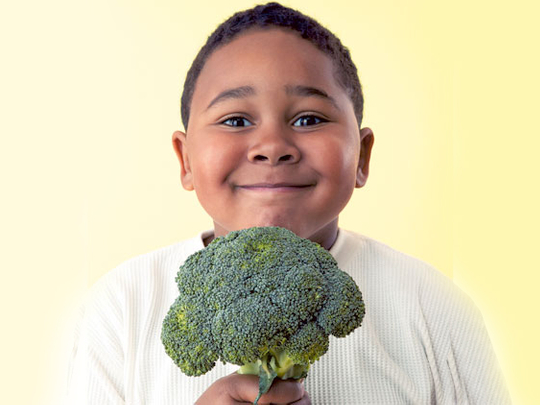
Lately I seem to be getting the same question over and over: “What do I do when my child wants to adopt a vegetarian lifestyle?”
For most, it begins with powerful feelings about animals. I can relate: I refused to eat meat at the age of 6 when I discovered the cows on a neighboring New Jersey farm were my dinner. Those feelings of outrage and empathy are real, so if your child feels strongly, it is safe to support her; just ensure her vegetarian diet is nutrient-rich.
In fact, the Academy of Nutrition and Dietetics says that “well-planned vegetarian diets are appropriate for individuals during all stages of the life cycle, including pregnancy, lactation, infancy, childhood, and adolescence, and for athletes.”
How you react to your child’s vegetarian declaration is key. Although the thought of making a separate meal for one child feels overwhelming, responding to your child with a frustrated “when you start cooking for yourself, you can eat anything you want” is probably not the best idea, however tempting it might be.
Studies show that kids often use food as a point of control with their parents, because what they put in their mouths is one of the few things they can influence while under a parent’s roof. But don’t transform this newfound interest in vegetarianism into a battle.
Instead show your child you respect her and are interested in her reasoning. Take this opportunity to set an example of how to respect other people’s choices, especially if they are different from your own.
Where do you begin if your child comes to you asking to forgo meat? Ask her questions about how she came to this decision. Not only will you learn something about your child - perhaps she has a future as an environmentalist or a veterinarian - but you might also find that eggs are still on the docket, or even fish and chicken. Perhaps it is just the red meat she is upset about. You won’t know until you ask.
Then educate yourself and your child about the nutrient disparities between omnivorous and vegetarian diets. That way she can make educated decisions when away from home.
Are you wondering how to get a vegetarian dinner on the table if your family is used to eating meat every night? Convert your family’s favorite meals into vegetarian versions of the original. A chicken stir-fry works with vegetables and brown rice. A taco doesn’t need steak, chicken or fish; beans and vegetables make ideal fillings.
Name a soup, and I bet it can be made without meat. And who says a burger has to be ground beef? Bean and quinoa burgers are pleasing variations. Most family members could benefit from a few thoughtful vegetarian meals, and this way you won’t find yourself cooking two meals.
Unearth some vegetarian cookbooks at the library for your child to explore. There are also millions of recipes online. This will help you learn what foods she is interested in eating. Then ask her to help you do some of the cooking. Letting your child take some of the responsibility for this decision is smart: Kids should learn to cook and should understand how their demands impact their family.
If she actually gets in the kitchen, then suddenly that line - “when you start cooking for yourself, you can eat however you want” - might actually apply.
Nutrients to watch for:
PROTEIN
When I was in high school, the typical vegetarian ate pasta and bread. Vegetables, too, of course, but there were many who loaded up on refined carbs in place of meat. These folks probably didn’t consume enough protein. Protein makes up about 20 percent of a healthy body, including bones, hair, skin, nails, enzymes and neurotransmitters, and provides 10 percent of our energy. So be sure your child gets enough.
Vegetarian protein sources include:
- Legumes (lentils, peas)
- Beans (Great Northern, black, pinto)
- Whole grains (quinoa, millet, oatmeal, brown rice)
- Nuts and nut butters
- Seeds
IRON
A lack of iron affects energy levels, blood health and the transfer of oxygen through cells, so it is important to eat enough iron-rich foods when not eating meat. Vegetarian iron (non-heme iron) is absorbed less easily than iron from animal products (heme iron). Vitamin C helps the body absorb iron, so broccoli, spinach, tomatoes and citrus are the perfect mate to vegetarian iron-rich foods.
- Pumpkin seeds, cashews
- Lentils, kidney beans
- Oatmeal, barley, quinoa
- Spinach, Swiss chard
CALCIUM
We all know we need calcium for bones, but it is also important for heart, muscle and nerve function. Most people think of dairy as a main source of calcium, yet there are many delicious vegetarian sources of this mineral, too.
- Vegetables (broccoli, squash, kale, sweet potatoes)
- Legumes (navy beans, kidney beans, Great Northern beans)
- Whole grains and seeds
- Fruit (oranges, raisins)
- Tofu
VITAMIN B12
Vitamin B12 is important for stabilizing mood and memory, yet it isn’t found in plant foods except for sea vegetables; therefore, a best bet is to take a supplement. Check with a doctor before changing a diet or adding a supplement.
VITAMIN D
Vitamin D helps build strong bones and prevent disease. Sources include sunlight, fish, eggs and dairy. A supplement is ideal when eating a strict vegetarian diet and living in the mid-Atlantic or northern states. Check with a doctor before changing a diet or adding a supplement.
OMEGA 3s
Omega 3 fatty acids have been shown to reduce inflammation and help prevent heart disease and many other chronic illnesses. These healthful fats are most frequently derived from salmon and other wild fish, so if fish is absent from the diet, eat walnuts and ground chia and flaxseeds to get these essential fats.
Casey Seidenberg is co-founder of Nourish Schools, a Washington, D.C.-based nutrition education company.












